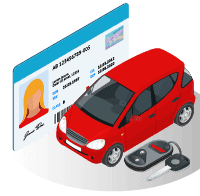Driving in France in 2021: Requirements, Checklist and Advice

Want to subscribe to a French energy offer?
Our English-speaking Selectra advisors are here to help you find the right energy plan.
(foreign IBANs accepted) at [email protected]. You can contact us also:

Planning a road trip in France? Moving to the French countryside and taking your car with you? Just bought a French car? Whatever your situation, if you’re planning to get behind the wheel in France, it’s important to be aware of the regulations in place. Find out all about these rules, with tips and more below.
Driving in France: important specificities
France is a very regulation-heavy country when it comes to driving, and some aspects of the law may differ from the rules from where you come from. In particular, be aware of the following specificities:
General rules when driving in France
First off, it is important to note that some of the general driving rules in France may differ from those you have been used to back home. Whether you have your own vehicle, bought a used French car or are renting a car in France, make sure to take note of the following legal requirements:
- In France, vehicles are driven on the right side of the road, and contrary to countries such as the United Kingdom. Consequently, overtaking is done on the left.
- You must be over 18 to drive in France - again, contrary to places like the United Kingdom and the United States where the minimum age is set to 17.
- Drivers with under 3 years of experience on the road are kept to a blood alcohol limit of 0.2 grams/litre, as opposed to 0.5 grams/litre for other drivers in France. The French police are in right to carry out breath tests at random and will do so automatically for all drivers involved in a car offence or accident. The best way to avoid any troubles will simply to not drink at all before hitting the road.
- French driving laws prohibit the use of headphones and headsets under all circumstances whilst driving, the only exception to this being integrated headsets for motorcyclist helmets.
- Phones can only be used via a fully fitted wireless Bluetooth car kit.
- In major cities such as Paris, Lyon, Lille, or Marseille, a Low Emission Zone measure has been implemented in order to improve air quality. During days of high pollution levels, only vehicles displaying the "Crit’Air" sticker on their windscreen will be able to circulate. You shouldn’t be bothered with this regulation during a short tourist trip, unless it, unfortunately, falls on a high pollution day.
- The very French-specific “Priorité a droite” road sign, which is often put up in built-up areas, means you need to give way to traffic coming from the right. It is a by default rule, meaning that if you come to a crossing without any road signs saying otherwise you have to give way to vehicles on your right.
Road signs in France If you have never driven in France before, it may be worth taking some time to familiarise yourself with the main French road signs, their appearance and their meanings before you start your trip
Seat belts regulations in France

It comes as no surprise that seat belts are mandatory in France and that every passenger in a car is required to wear a seat belt at all times. This said, specific rules apply to infants and children, which you should make sure to respect. Precisely, children under the age of 10 need to be seated in a car seat or a restraint, with specific conditions depending on their weight:
| Age of the child | Seating requirement |
|---|---|
| Children under 10 kg (22 lbs) | In a rear-facing seat, either in the front passenger seat (with deactivated passenger airbag) or a back seat. |
| Children between 9 kg (20 lbs) and 18 kg (40 lbs) | In a child seat including a harness or protection tray. |
| Children between 15 kg (33 lbs) and 36 kg (80 lbs) | In a booster seat, used in conjunction with an adult seatbelt. |
Regardless of weight, children under 10 years old are not allowed to travel in the front seat without a child restraint. The only exceptions to this are if there are no rear seats in the vehicle, if the rear seats are already occupied or if there are no seat belts in the vehicle.
Speed limits and regulations
| Road type | During dry weather | In rain/snow |
|---|---|---|
| Motorway | 130 km/h (80mph) | 110 km/h (68 mph) |
| Dual carriageway | 110 km/h (68 mph) | 100 km/h (62 mph) |
| Other roads | 80 km/h (50 mph) | 80 km/h (50 mph) |
| Other roads | 50 km/h (31 mph) | 50 km/h (31 mph) |
Since July 1st, 2018, the speed limit on single carriageway roads without a separating guard rail has been brought down from 90 km/h (55 mph) to 80 km/h (50 mph).
It is strictly forbidden to carry radars in a vehicle, and failure to comply can entail a €1,500 fine or even getting your vehicle confiscated. If your Sat Nav has the radar-detector technology, with maps showing the location of speed cameras along your journey, you will need to deactivate this feature before hitting the road in France.
Parking regulations in France
One of the most important rules to keep in mind is to never stop or park on a single yellow line, as this will result in either a fine or the car getting towed away. A broken yellow line indicated stopping is permitted, but parking isn’t.
Checklist of items to keep in a car in France
Make sure you gather all the relevant items and documents for driving in France ahead of time, to ensure your trip goes as smoothly and safely as possible. Find the details below.
Documents to have at hand to drive in France
Whether you are planning only a short stay or are moving to France permanently, the following important documents need to be in your car with you at any given time when driving on the French territory:

- Passport
- Driving Licence / International Drivers' Permit
- Proof of Ownership (the equivalent of V5 Logbook in the UK for instance)
- Insurance Documents: check whether your French car insurance policy will properly cover you during the full length of your stay in France (some policies may only be fully comprehensive in your home country, and only offer minimal, third-party care when abroad). Also, make sure to keep your insurance company’s phone number at hand in case you ever need. Even better, take out a European Breakdown Coverage to put your mind at complete ease.
- The vehicle inspection certificate, also known as M.O.T. in the UK (for cars over 3 years old)
Items to keep in a car to drive in France
The following items are mandatory to have in a vehicle in France at any given time, and failure to comply with this rule can incur an on-the-spot fine.
It is recommended that you get your hands on an AA kit for travels in Europe, that will contain all the essential accessories for safe driving in France, ahead of time. These are readily available to order online for under €30.
- Headlamp converters: under French law (and most European countries), it is obligatory to have a set of headlamp converters fitted in your vehicle. These act as headlight beam deflectors and prevent potential accidents caused by shining headlights directly onto oncoming traffic. Failure to respect this rule can lead to a €90 fine.
- Spare bulbs: carrying spare bulbs is an obligatory precautionary measure, in order to be able to change out faulty ones there and then. Failure to respect this rule can lead to an €80 fine.
- High visibility vest: these reflective jackets were introduced in 2016 as a mandatory feature to carry in any car in France. These should be stored in the car cabin and not the boot, and doing the latter could make them harder and dangerous to access. Indeed, the unlikely event of an accident, or a breakdown, you and all the passengers will need to stand next to the vehicle on the hard shoulder or roadside, and each wear a high visibility vest (you should thus plan to have the appropriate number of vests in your vehicle depending on how many people you usually travel with). This law applies to motorcyclists too. Failure to respect this rule can lead to a €135 fine.
- Warning triangle: this device needs to be in a car at all times, and in the case of an accident, placed on the hard shoulder ahead of the scene, as a warning signal to oncoming vehicles. Failure to respect this rule can lead to a €135 fine.
- Your country sticker (GB sticker for British drivers for instance)/ you need to display the official sticker relative to your country of origin, on the rear of your vehicle. Failure to respect this rule can lead to a €90 fine.
- Breathalyser: the French government planned to establish a small fine for any drivers not carrying a breathalyser in their vehicle, however, this never got put into place. Failure to respect this rule thus won’t lead to a fine, but it is greatly recommended to keep an unused, NF-certified, and in-date breathalyser in your car all the same. Note that single-use models have a lifespan of 12 months, so make sure yours is still in-date if you already have one.
- Helmet and reflective elements for motorcyclists: these are absolutely mandatory for obvious safety purposes, and failure to comply will incur a €135 fine at least.
- Glasses: if you need glasses to drive your car, it is mandatory in France that you carry a spare pair of glasses in your car at any given time.
What to do in case of a breakdown in France

In the unlikely but serious event of your having a car breakdown in France, don’t call your breakdown insurance company right away. If you’re broken down on the motorway, you will need to use of the orange emergency phones which are found at regular interval along the road on the hard shoulder - just make sure to put yourself and other passengers out of danger and traffic before you do. This orange phone service will put you in contact with a local breakdown company which will tow your vehicle to a recovery zone.
Once this is done, you can then contact your breakdown provider to get the insurance sorted out - ideally, you should take out a European breakdown cover as stated above, so as to see your breakdown taken care of as efficiently as possible.
Here is a list of the important emergency phone numbers in France which are handy during your journey.
Be sure to also check out this Moving to France Checklist, which recaps all the steps to follow before you start your new life in France!